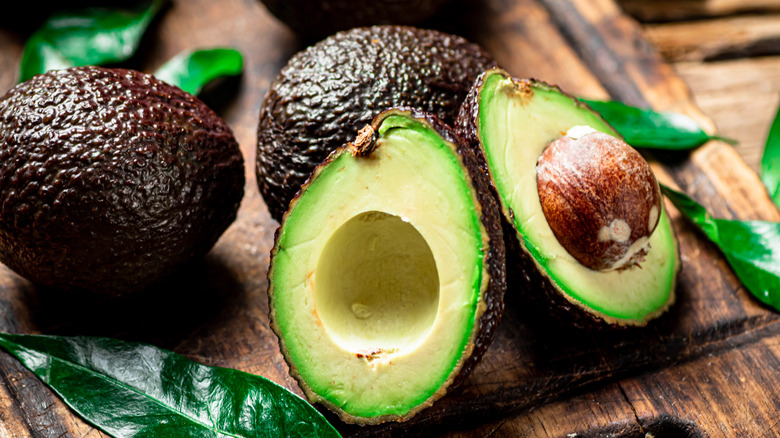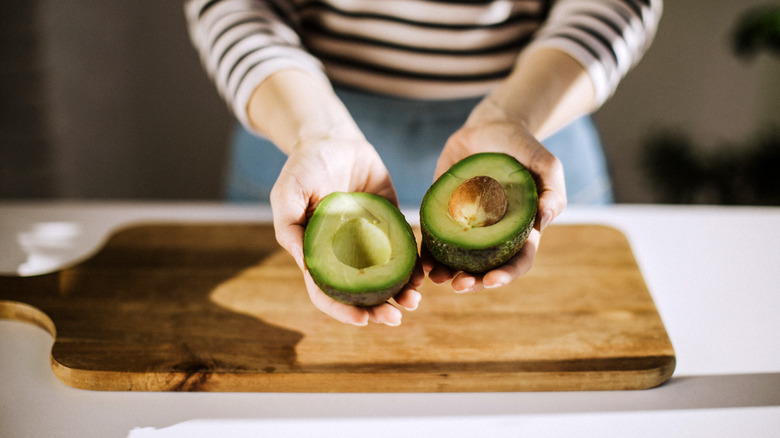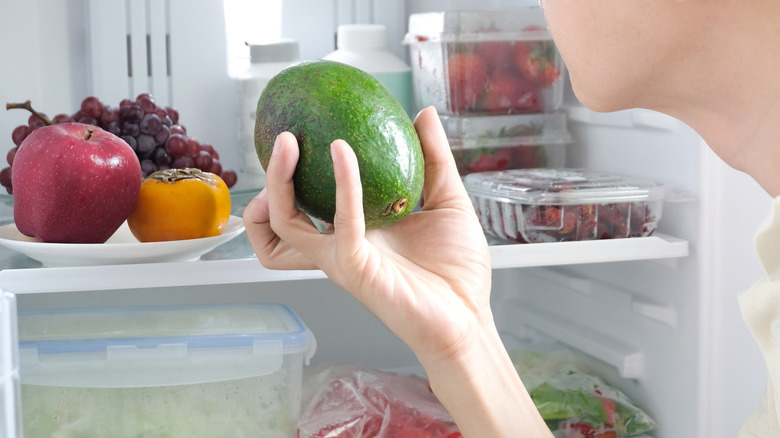Why You Should Never Store Avocados In Water
Avocados are delicious, of course, packed with nutrients, and a great addition to almost any recipe. However, they also tend to go bad, often rather abruptly. And it can be difficult to pick the perfectly ripe avocado when you need it. Because of this, many cooks, home or otherwise, have developed hacks, tricks, and tools to keep their avocados fresh. And, as the internet is wont to do, several viral methods of avocado preservation have circulated the internet, all promising to extend the shelf life of those finicky green fruits. One particular hack has gone viral in recent months, taking over TikTok and X, formerly known a Twitter. And it is no wonder as to why. The method is simple and aesthetically pleasing, calling for avocados to be stored in a large container full of water. This vessel is then placed in the fridge, with the stored avocados bobbing pleasantly beneath the surface.
This hack claims to extend your avocados' shelf life by to up to two weeks. However, despite these grand promises, you will want to hold off on giving your avocados the plunge, as this food storage hack could actually prove to be a breeding ground for potentially hazardous food-borne pathogens. Most notably, the pathogen known as listeria, which thrives in moist environments and can withstand refrigeration, has the potential reproduce rapidly in this soggy storage environment. Bacteria such as listeria is nothing to mess with. In response to this growing trend, the Food and Drug Administration told Good Morning America that it "does not recommend" this storage hack, as this could allow pathogens on the avocado's surface to "multiply."
The dangers of listeria (and other foodborne pathogens)
Now, you may think that the flaw in this hack is only skin deep, and that you could simply scrub away the harmful bacteria from the avocado's surface before storing in water. But you would be wrong. For starters, one FDA study found Listeria monocytogenes, or listeria (the bacteria that causes listeriosis), on 18% of avocados tested. That is no small amount, especially for such a dangerous bacteria. Listeria can cause typical symptoms of food poisoning, such as nausea and digestive upset. But it can also cause more dangerous complications, especially for those with weakened immune systems and those who are pregnant.
The seemingly obvious solution to this concern would be to first scrub your fruit before giving it the plunge. However, submerging the avocado in water makes it possible for any remaining traces of the pathogen left on the surface to permeate through the skin into the pulp of the fruit, so a simple wash isn't enough to remove the risk of this storage method.
Further, submerging your avocados into water is essentially introducing your fruit into an environment ripe for bacterial reproduction, increasing the likelihood of illness. And listeria isn't the only bacteria you will need to worry about, either. Pathogens such as salmonella are also a risk when it comes to avocados, and salmonella thrives in moist environments, which can extend its ability to live on your food's surface. So next time you buy a batch of avocados, you might want to think twice about trying out this TikTok hack, and perhaps try a safer method of storage instead.
How to properly store your avocados
This doesn't mean that there is no way to extend the shelf life of your avocados. After all, the fruit is too tasty to let it go bad on the counter. There are simply too many guacamole recipes to try (Ina Garten has a particularly simple and ingenious recipe), and too many plates of the internet famous avocado toast to indulge in. So what is the best way to store your avocados? There are a few key pointers to keep in mind.
For unripe (and uncut) avocados, you can simply let them sit on the counter until they turn ripe. Once they have come to ripeness, you will want to eat the fruit as soon as possible. You can also store them in the fridge if you would like to extend their shelf life, although it is best to consume ripe avocados within a few days. So don't slack on your ripe fruit. If you're hoping to store cut avocados, you should most definitely store them in the fridge, in a closed container or wrapped in plastic. A squeeze of lemon juice will help to prevent browning. But, again, it is best to not let these avocados sit in the fridge for too long. Like sliced avocados, you will want to place a barrier around smashed or cubed avocados (including guacamole). Keeping them in an airtight container will help prevent spoilage.


